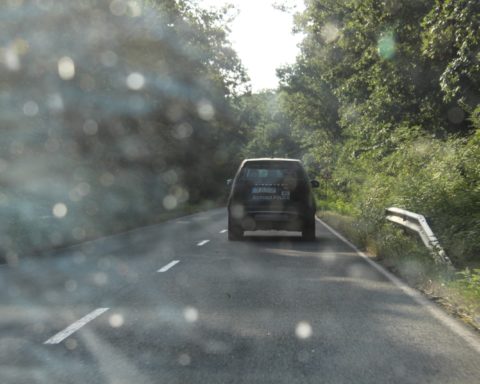The first information about the fire that broke out in the Lipa camp (canton of Una Sana, Bosnia-Herzegovina) date back to the morning of 23 December.
Local and international news outlets reported that the flames began to spread soon after the last of the migrants were finishing fleeing the camp. It would appear that none of the residents and staff were injured.
Since the outbreak of the fire, there have been conflicting voices about responsibility.
Peter Van der Auweraert, IOM director for Bosnia and Herzegovina, said on Twitter that the flames were set by a group of former residents:
“Disaster upon disaster in #Lipa #Bihac #BiH – as far as we know now a group of former residents put three tents and containers on fire after most of the migrants had left the camp. Luckily no casualties to our knowledge at this point but disaster nevertheless”.
Even some local newspapers report that the fire, which broke out in an area where there were power generators and electrical equipment, had an intentional origin.
Various witnesses at the scene, including No Name Kitchen->https://www.facebook.com/NoNameKitchenBelgrade, report that the flames began to flare up immediately after the facility’s clearing operations began.
In fact, in the days preceding the debate on the fate of the Lipa Camp had been tightened with IOM, cantonal and central governments taking responsibility for the site’s compliance. We recall in fact that Lipa was established after the eviction of the Vucjack jungle and further “filled” with people in transit following the lockdown’s establishment in the fields, during the first wave of Covid-19.
The IOM had repeatedly expressed concern about the living conditions of the residents, while the Bosnian authorities affirmed their economic incapacity in the face of managing the thousands of people present in Bosnia and Herzegovina.
At the moment one of the options proposed by the security minister seems to be the temporary reopening of the Bira camp, on the outskirts of the city of Bihać, to prevent the approximately one thousand people from dispersing into the woods and makeshift housing along the border. Statements that do not take into account the recent hostility of the authorities and the local population towards this possibility. Hostility that, in some cases, has turned into a real conflict, as reported by the local press and denounced by activists.
Other testimonies collected on site by Sos Balkan Route tell that many migrants were heading to camp Bira, but that they would have been stopped by the police in thin air.
At this moment, what appears certain is that many migrants will join the thousands of those who are already outside the official sites, suffering from the rigors of winter, the violence and abuses of the border police in an attempt to cross the border putting into practice their “right of escape”.
The fire in the Lipa camp, as well as that of Moria in Lesvos increasingly demonstrate the total inadequacy of the EU migration policies which, by militarizing and externalizing the borders of the Union, cause these humanitarian crises.
In fact, as the European Commission statement of 30 November 2020 reports, free movement within the Member States is presented as an essential value, to which much can be sacrificed. In fact, the new European pact on migration and asylum appears to be fundamental, in which there is no hesitation in the strengthening of coast and border guards, starting with Frontex without any mention of the abuses committed in the Mediterranean or along the Balkan route. .
Is it perhaps the much vaunted European way of life that provides the alibi for the atrocities that take place in the border areas?
The only solution presented in the eyes of European citizens appears for what it is: greater security control (collaboration and increased action by the various police forces, the Croatian torture inflicted on refugees are school) to defend against those who have nothing.
Until a radical change in migration policies takes place, we cannot but declare ourselves accomplices of people in transit, who try to cross the borders by any means necessary, juggling police abuse and political exploitation.






